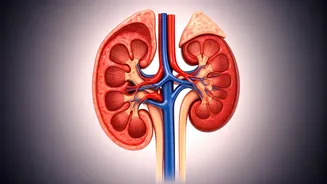Dangerous Kidney Habits
According to the cardiologist, there are several things that individuals frequently do that can be detrimental to kidney health. It's imperative to recognize
these potential risks to prevent kidney problems. The first thing is to be aware of the importance of maintaining proper hydration. Inadequate water intake forces the kidneys to work harder, which can, over time, place significant strain on them. Another problematic habit is the overuse of painkillers, particularly nonsteroidal anti-inflammatory drugs (NSAIDs) such as ibuprofen and naproxen. These medications, taken frequently or in high doses, can damage the kidneys. Additionally, the cardiologist pointed out that a diet high in processed foods, sodium, and added sugars is damaging. This kind of diet can contribute to high blood pressure and diabetes, two leading causes of kidney disease. Furthermore, regular consumption of excessive alcohol can also tax the kidneys significantly. Lastly, neglecting regular check-ups and failing to monitor chronic conditions like diabetes and high blood pressure puts one at increased risk of kidney damage, as early detection and management are key to preventing further complications.
Dehydration's Impact
One of the most common threats is insufficient water intake, something that may seem minor but carries considerable weight. When the body is dehydrated, the kidneys struggle to effectively filter waste products from the blood. This increased burden can lead to kidney damage over time, potentially causing kidney stones or, worse, chronic kidney disease. Hydration is not just about drinking water when feeling thirsty; it’s about maintaining a consistent intake throughout the day. It is recommended to keep a water bottle close and sip on it regularly, especially during warmer weather or after physical activity. Recognizing the signals of dehydration, such as dark urine, decreased urination frequency, and fatigue, is key to correcting the imbalance promptly. Making hydration a daily habit can significantly ease the strain on the kidneys and promote overall health.
Painkiller Overuse
Excessive use of painkillers, especially common over-the-counter medications such as ibuprofen and naproxen, is another key concern. While these drugs can provide temporary relief from pain, their frequent or high-dose use can have a serious impact on the kidneys. These medications can restrict blood flow to the kidneys, leading to injury and decreased function, known as analgesic nephropathy. Many people take these painkillers without considering the potential risks, unaware of their long-term effects. The cardiologist warns that taking these drugs regularly, or combining them with other medications, dramatically increases the chances of kidney damage. Those experiencing chronic pain should seek medical advice to identify safe pain management strategies that do not jeopardize their kidney health. It is essential to consult with a doctor before making painkillers a regular part of one's routine.
Diet and Kidney Health
Diet also plays a crucial role in kidney health. A diet high in processed foods, sodium, and added sugars poses a major risk. These dietary choices can contribute to high blood pressure and diabetes, which are the two primary causes of kidney disease. Processed foods are often loaded with sodium, which elevates blood pressure, putting more stress on the kidneys. Excess sugar intake can lead to insulin resistance, potentially causing diabetes and additional kidney damage. Similarly, regularly eating foods rich in saturated and trans fats increases the risk of cardiovascular diseases, which can indirectly affect kidney function. The cardiologist emphasizes the importance of adopting a balanced diet filled with fresh fruits, vegetables, and lean proteins, and minimizing processed foods, to protect kidney health. Reading food labels carefully and choosing whole, unprocessed foods can greatly assist in maintaining a healthy diet.
Alcohol and Regular Check-ups
Excessive alcohol consumption and neglecting regular health check-ups complete the list of dangerous behaviors. Heavy drinking can damage the kidneys directly and can worsen conditions like high blood pressure, thereby increasing the risk of kidney disease. Frequent and excessive alcohol intake can disrupt kidney function, reducing their ability to effectively filter waste. Regular health check-ups are also crucial. They enable early detection of kidney issues, such as diabetes and hypertension, and their proactive management. Often, early stages of kidney disease have no obvious symptoms, making regular check-ups even more important. By maintaining regular appointments with a doctor, especially for those at risk, individuals can ensure that any potential kidney problems are addressed before they become serious. Early detection and proactive intervention can significantly improve outcomes, making consistent medical care a cornerstone of kidney health.













